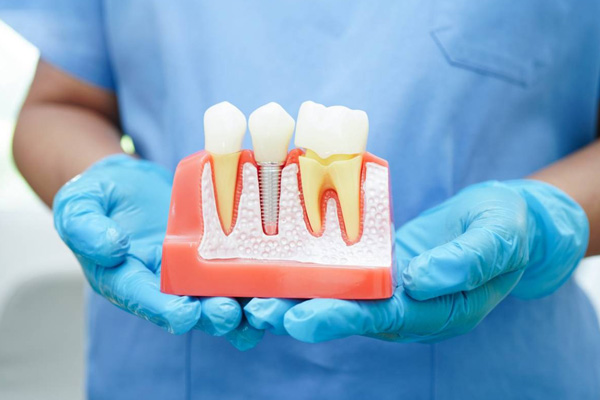Modern dentistry offers various state-of-the-art solutions for individuals who have lost some or all of their teeth. Restorations such as all-on-4 dental implants are considered the most sophisticated option available today. However, implants are a costly and time-consuming procedure, and it is understandable if you want to know how long dental implants last. In this article, we discuss the longevity of dental implants and how to properly care for this dental restoration.
How Long Do Dental Implants Last?
Before discussing the longevity of dental implants, it is essential to note that they consist of two main components: metal posts (the actual implants) and dental crowns. Metal posts, typically made of titanium, perform the function of the roots of your natural teeth. They are fused with the jawbone and, with good care, usually last for decades or even a lifetime. Dental crowns, on the other hand, usually need to be replaced every 10 to 15 years, as they are made of porcelain. This material is very durable and stain-resistant, but it still gets worn out over time.
The longevity of your dental implants can depend on such factors as:
- The initial health of your jawbone and your oral health
- The quality of the materials used for your implants and the competence of the doctor performing the surgery
- Underlying general health conditions
- Lifestyle habits
- Dietary habits
- Efficiency of your oral hygiene routine
- Frequency of dental visits
How to Prolong the Lifespan of Your Dental Implants
Regardless of the type of dental implants you have, several guidelines will help you ensure your dental restoration lasts longer.
Good Oral Hygiene Is a Priority
Even if all your natural teeth are replaced with dental implants, it does not mean that you should neglect your oral hygiene routine. Indeed, artificial porcelain crowns on dental implants cannot cause cavities. However, plaque, food residue, and tartar still accumulate on the surface of the crowns and along the gum line.
Plaque and tartar are ideal environments for bacteria, which can cause periodontal disease (also called gum disease). It is a hazardous chronic infection of the gums that destroys the gum tissue and the jawbone. The condition can undermine the stability of your implants or even lead to implant failure. Follow these rules to prevent gum disease:
- Brush your teeth twice a day for two full minutes. Pay special attention to cleaning along the gum line.
- Use fluoride toothpaste that will help reduce bacterial growth in the mouth.
- Floss every evening. Ensure that you remove all food debris and plaque, including any that may be collected under dental appliances such as dental bridges.
- Include a water flosser in your routine to further enhance your oral hygiene. This device has been proven effective in reducing the risk of gum disease.
- Do not neglect your regular dental appointments. It is a good practice to have professional cleanings and checkups twice a year, even if your at-home hygiene routine is excellent. Some people might be recommended to have more frequent visits, depending on the condition of their oral health.
- Abstain from smoking, as this habit is one of the leading risk factors for gum disease and gum recession.
Preventing Physical Damage
Prevent your implants from chipping, cracking, or getting displaced by wearing a mouthguard when playing sports or if you have bruxism. Also, never use your teeth as tools, and limit such habits as nail biting or chewing on hard objects.
Good Dietary Choices
Implants are rightly considered the most sophisticated dental restoration, as they provide up to 90% of the natural bite force. This means that you can enjoy a wide variety of foods and improve your nutrition. However, there are certain foods it is still best to avoid if you have dental implants, as your artificial teeth are not invincible:
- Crunchy foods that can scratch the surface of the crowns and damage your gums
- Hard foods and foods that require a lot of biting and chewing force, as they can cause your implants to crack or break
- Sticky foods that can displace the crowns
- Staining foods and beverages (red wine, coffee, black tea, beetroot, candies with artificial dye, etc.)
- While the lifespan of your dental implants may benefit from avoiding these foods, you do not need to impose an absolute ban on these foods from your diet. If you continue to eat foods that fall under these categories, be sure to maintain an excellent dental care routine.
Get Reliable Dental Implants at Smile World Dental
Do not hesitate to schedule a consultation with an experienced dentist at Smile World Dental today. We use high-quality materials and state-of-the-art techniques to provide our patients with long-lasting and reliable dental implants. We are looking forward to your visit to our dental office.



